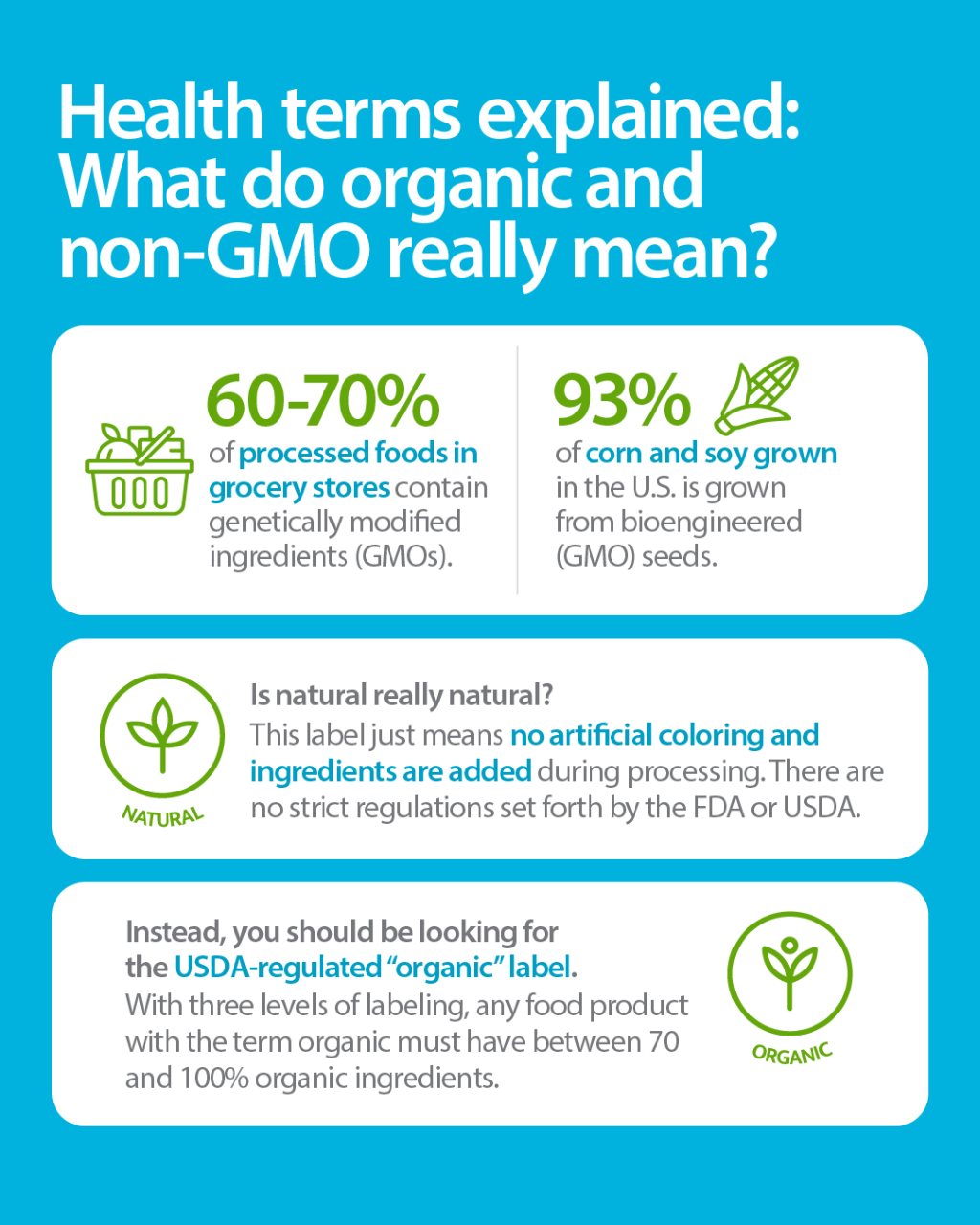Food producers will say anything to get you to buy their products, including making their goods seem healthier than they may be. We want to help you make the most informed decisions you can when reading packaging labels at the store. What terms are you most likely to see, and which have the least strict regulations defining what the labels can be used for?
Read on to break down these commonly used health terms:
What qualifies as organic or non-GMO?
There can be much confusion surrounding the term GMO, like what it means and the difference between non-GMO and organic foods. Shedding light on the subject will help you make an informed decision for your health.
What is a GMO?
A GMO, or genetically-modified organism, is any plant that has been selectively cultivated for specific characteristics for human enjoyment or consumption. The FDA (U.S. Food & Drug Administration) suggests using the term “bioengineered” for produce grown from genetically modified seeds in a lab, instead of “GMO” or “non-GMO.”
The FDA makes a distinction between produce any fruit or vegetable (including mushrooms, sprouts, and herbs)—and other foods, such as bread, meats, cheeses, and anything else. Foods can include various ingredients, some of which might’ve been grown from bioengineered seeds.
Because most foods aren’t singular organisms, food can’t be categorized as a GMO or as a non-GMO product. For example, a premade salad mix you buy at the store might include lettuce and tomatoes—either of which could’ve been grown from bioengineered seeds—but the salad itself comprises a combination of ingredients, so the GMO label couldn’t apply to it.
Instead, the FDA guides food producers to say “foods made from bioengineered seeds” or “foods not derived from bioengineered seeds,” which would be more precise and accurate.
Tip: So, how do you shop for food that isn’t produced through bioengineering? Simply put, you can start to look for foods with the USDA-Certified (U.S. Department of Agriculture) Organic label.
Then, what does organic mean?
When most people read the “organic” label on foods at the store, they think that means the food was farmed free of pesticides. In reality, while farmers cultivate organic food without genetically engineered seeds, non-manufactured pesticides are still used. There are more regulations on what types of pesticides farmers can use. Here’s what different organic classifications on labels mean:
100% Organic. These products must be made without bioengineered seeds, though they can still use approved pesticides. Organic farms are surveyed by the USDA every year to ensure that their farming methods comply with organic regulations.
Organic. Must be made with at least 95% organic ingredients.
Made with organic components. At least 70% of the product must come from organic ingredients.
So, if you are most concerned with finding foods that aren’t made from bioengineered produce, your best bet is to buy organic.
Some producers use terms like “natural” to cater to health-conscious buyers, but those terms do not mean organic. The only way to know if something is truly organic is to ensure that the packing has the USDA-Certified Organic label.
How natural are “natural” foods?
The term “natural” can be misleading when it comes to how foods are marketed in the grocery store. While it might seem that “natural” foods should be the most naturally grown, producers use this label to entice health-conscious shoppers.
Unlike with organic and USDA-Certified non-GMO foods, products labeled as “natural” do not need to follow any strict regulations set forth by the FDA or USDA. Instead, producers can sell “natural” foods made through any practice, as long as artificial coloring and ingredients aren’t added during processing.
There are no proven health benefits to foods labeled as “natural,” as the term only implies minimal processing on the products before boxing and selling. When developing a healthy diet, the type of food is generally more critical than its “naturalness,” as defined by the FDA and USDA.
It can be hard to know where to start when trying to buy foods with minimal processing. By understanding different health terminology, you can be a more conscious consumer.
We know making healthy food choices is important to you. To learn more about nutrition and developing a balanced diet plan, schedule a visit with a Baylor St. Luke's Medical Group primary care physician today.





